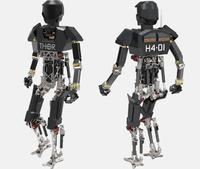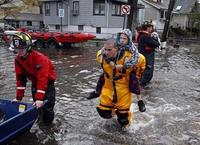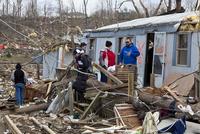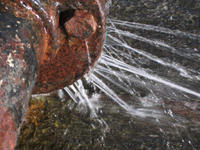-
Improving crop resilience, yields in a world of extreme weather
Farmers in the United States witnessed record-breaking extremes in temperature and drought during the last two summers, causing worldwide increases in the costs of food, feed and fiber. Indeed, many climate scientists caution that extreme weather events resulting from climate change is the new normal for farmers in North America and elsewhere, requiring novel agricultural strategies to prevent crop losses. UC Riverside-led research team develops new chemical for improving crop drought tolerance.
-
-
FEMA demands that Erie County, N.Y. return millions in disaster relief
The Federal Emergency Management Agency (FEMA) will hold off on deciding whether to collect millions of dollars given to Erie County, New York in the aftermath of the October Surprise storm of 2006. The record-shattering storm caused widespread damage in Buffalo, and FEMA gave Erie country millions of dollars in disaster relief. Departmental audit has found that country officials did not use the money properly, and FEMA wants $48 million of it back.
-
-
Cuomo: New York infrastructure must be made more resilient in face of climate challenge
New York governor Andrew Cuomo says global warming l is a serious threat and that all levels of government must work together to design a more resilient infrastructure to deal with the changing weather.
-
-
Remote-controlled cockroaches to help in search-and-rescue missions
Researchers are using video game technology to remotely control cockroaches on autopilot, with a computer steering the cockroach through a controlled environment. The researchers are using the technology to track how roaches respond to the remote control, with the goal of developing ways that roaches on autopilot can be used to map dynamic environments — such as collapsed buildings.
-
-
Robots to assist humans in mitigating, recovering from future natural and man-made disasters

The goal of DARPA Robotics Challenge (DRC) is spur development of advanced robots that can assist humans in mitigating and recovering from future natural and man-made disasters. Seven teams will receive DARPA support to compete with an ATLAS Robot in 2013.
-
-
Maryland shorelines facing sea level rise threatening state’s infrastructure: report
Maryland has 3,100 miles of tidal shoreline and low-lying rural and urban lands that will be impacted. A new report on sea level rise recommends that the State of Maryland should plan for a rise in sea level of as much as two feet by 2050. Governor Martin O’Malley said that “[we must] ensure that we have a sound understanding of our vulnerability and are making informed decisions about how best to protect our land, infrastructure, and most importantly, the citizens of Maryland.”
-
-
The future of Colorado River flows
The Colorado River provides water for more than thirty million people, including those in the fast-growing cities of Las Vegas, Phoenix, and Los Angeles. Increasing demand for that water combined with reduced flow and the looming threat of climate change have prompted concern about how to manage the basin’s water in coming decades.
-
-
The contribution of social bonds to resilience in the Wake of Superstorm Sandy

A survey reveals new information about the importance of social and community bonds in recovery from a disaster like Superstorm Sandy. The survey data illustrate how important the help of friends, family, and neighbors can be in getting people back on their feet after natural disasters. These crucial social bonds are often overlooked as policy discussions tend to focus on the role that official institutions have in fostering resilience.
-
-
Planned Calif. building demolition to provide information about nearby fault
When California State University, East Bay (CSUEB) demolishes its seismically unsafe Warren Hall this summer on its Hayward campus, the landmark building’s implosion will produce energy similar to a small earthquake which can be used to study and map the nearby Hayward Fault. In cooperation with the university, the U.S. Geological Survey will observe and record the mid-August implosion on hundreds of seismographs temporarily set out in a roughly one-mile radius from Warren Hall.
-
-
Bolstering pre-disaster resilience significantly reduces post-disaster recovery cost
A new study finds that the federal government spends six times more on post-disaster disaster recovery efforts than on helping communities become more resilient to extreme weather which is predicted to become more intense and frequent. The study, citing Federal Emergency Management Agency (FEMA) estimates, calculates that for every $1 invested in “pre-disaster” mitigation, the cost of damage from extreme weather is reduced by $4.
-
-
$110 billion in damages makes 2012 second only to 2005 in terms of weather-related disasters

The U.S. National Climatic Data Center’s (NCDC) says that 2012 saw eleven weather and climate disaster events each with losses exceeding $1 billion in damages. This makes 2012 the second costliest year since 1980, with a total of more than $110 billion in damages throughout the year. The 2012 total damages rank only behind 2005, which incurred $160 billion in damages due in part to four devastating land-falling hurricanes.
-
-
USDA announces additional emergency watershed protection funding
USDA’s Natural Resources Conservation Service will send an additional $66.8 million in Emergency Watershed Protection Program funds to help disaster recovery efforts in fifteen states.
-
-
Weather reports aid life-or-death decisions in Africa
The people living in sub-Saharan Africa have a life-or-death dependency on information about the weather. Knowing when, where, and what to grow or graze animals can be the difference between a bumper harvest and facing starvation. Although sub-Saharan Africa depends more directly on rainfall than any other region on Earth, the region has the fewest number of rain monitoring stations. There are also significant delays in the time between measurements being made and the resulting data being made available.
-
-
New Jersey faces costly water infrastructure upgrades

Before Hurricane Sandy hit New Jersey, state officials knew they had much work ahead of them to update the state’s water infrastructure. The damage Sandy inflicted only highlighted the inadequacies of New Jersey’s outdated wastewater, stormwater, and drinking water infrastructure. Upgrading the system will be costly, but not doing so will be costlier.
-
-
Engineers on a wind load reconnaissance visit to tornado-hit Moore, Oklahoma
Eight days after an EF5 tornado struck Moore, Oklahoma, an 8-member team from the American Society of Civil Engineers’ (ASCE) Structural Engineering Institute (SEI) visited the area to assess the performance of critical facilities that either resisted or suffered significant damage from the estimated 200+ mph winds. The team studied four elementary schools and a hospital, and also examined the failures of long-span roof structures.
-
More headlines
The long view
The Surprising Reasons Floods and Other Disasters Are Deadlier at Night
It’s not just that it’s dark and people are asleep. Urban sprawl, confirmation bias, and other factors can play a role.
Why Flash Flood Warnings Will Continue to Go Unheeded
Experts say local education and community support are key to conveying risk.
